#wasp death
Photo
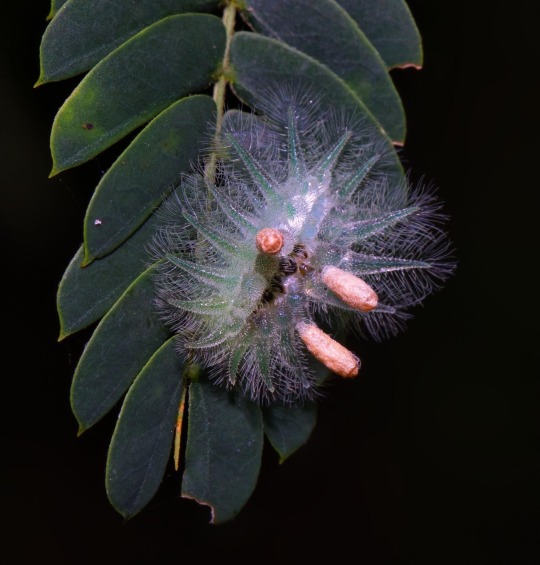
Spun glass slug moth caterpillar (Isochaetes beutenmuelleri) with attached cocoons from parasitoid wasps
Parasitoid braconid wasps will lay eggs on or into host caterpillars. The eggs hatch and the wasp larvae live inside and feed on the caterpillar’s body. The larvae then emerge and spin a cocoon attached to the caterpillar to pupate inside. The host caterpillar is usually killed, though sometimes they manage to pupate first.
Photo by lyndawill777
#animals#curators on tumblr#insects#bugs#caterpillar#moth#larva#slug moth caterpillar#slug moth#spun glass slug moth#parasite#parasitoid#wasp#braconid wasp#bug death#one nice bug
504 notes
·
View notes
Text
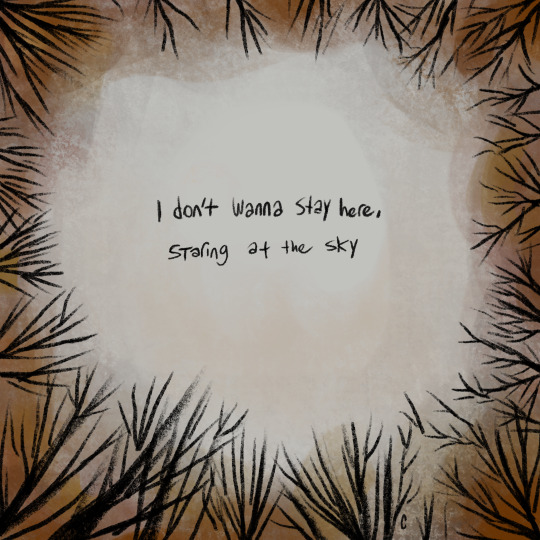

Every time I come across a song that reminds me of my characters I lose my mind
#myart#fester#Jackie winston#song is wasp in a jar by cross records#death#her hairs too long and I’m not gonna fix it
116 notes
·
View notes
Text

req'd by @catboygiroux
explain this then
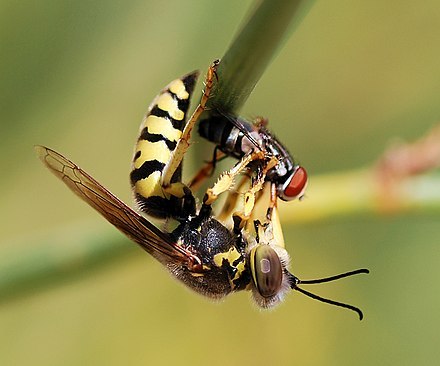
(courtesy of wikipedia)
text: Wasps do not bite, they don't have teeth
#calligraphy#shitpost#bug#wasp#animal death#well sorta a fly gets it#its the cirrrrrcle of lifeeeee#and the meal of waspssss
209 notes
·
View notes
Text

You are five when your Quirk manifests for the first time, with Rinchan.
‼️📍 content warnings: implied major character death, death in general, in a myriad of ways (falling, head trauma, old age, drowning, suicide), im a little graphic for emphasis, grief and mourning. there’s also some light smut and implied underage sex.
Rinchan. Rinchan who watches you while your mother goes to work. Rinchan with her big, soft, crepe-paper arms; who holds you in them for as long as you want, singing you songs as she shells peas into a metal bowl—you clinging to her, placid as a koala, your legs dangling over her lap. Rinchan who is probably your most favourite person in the entire world—the entire world being your neighbourhood and your school and the nearby park, overgrown, and the overwhelming shopping centre a car ride away.
Rinchan. Rinchan. Rinchan who, when you are five, starts appearing before you naked and wet, her face covered in blood.
The first time it happens she’s still alive; the sizzle of her cooking coming from the kitchen just behind you as you sit on the floor with a pile of milk-chews in front of you, staring in frozen horror at this other her—shining with water, her mouth stretched open in a startled O, everything about her soft and sagging.
You make a tiny noise—fear, caught in your throat, a baby mouse curled up—and then Rinchan, your Rinchan, Rinchan alive and warm and dry, calls out, “Are you okay, Baby?”
The Other Rinchan’s mouth stretches open further, like it recognises her—like it’s trying to say something back and you—
You wail in answer, scrabbling at Rinchan (living, alive) when she flys in, concerned, asking, “What? What? What is it? What’s wrong?” her soft crepe-paper arms around you tight as you sob into her neck.
She’s bewildered and a little frightened herself; but she hums as she rocks you, a warm hand stroking your back, soothing you both until your sobs are little more than wet snuffling, your hand curling into the fabric of her dress.
You loved her. You love her, still, after all this time. But that love doesn’t save either of you, and you are haunted by the other Rinchan for the rest of that awful summer: in the park, with your friends, Rinchan watching, mouth agape, from the bushes. Walking home, hand-in-hand with your mother, Rinchan behind you. Alone in your bedroom, at night, Rinchan standing over you as you watch the water drip down her skin. You start wetting yourself with the fear, whenever it happens—a response that quickly loses you those parkside friends and worries your mother and living Rinchan sick, the pair of them whispering about you when they think you can’t hear, their fear—your fear—condemning you to pull-ups, like a giant baby.
It doesn’t stop the end from coming.
Rin dies just before Halloween, when the shops are filled with green-faced witches and plastic skeletons that rattle and can’t frighten you, anymore. She dies alone, at night. A fall in the shower, your mother tells you in a whisper a couple of days later, red-eyed. You knew enough by then to be able to picture it: Rin, shining with water, her mouth stretched open in a startled O—her face covered in blood.
Your mother holds your hand at her funeral, too tight, and you cling back and say nothing.
The other Rinchan never comes back. Rin never comes back—cannot come back, no matter how much you love her.
Others do, though.
It’s a parade of the dead, shuffling forward to a dirge only you can hear. You learn, over time, that it’s specific to people you either know or will come to know—people you have some kind of tie to, some bond, good or bad. When you are fifteen it’s your homeroom teacher Miss Aoki: her head and shoulder caved in, her right eye bulging out at you, unseeing. You’d been drinking a bottle of milk-tea when she arrived, the blood stark and jewel-like in the daylight. You do not touch milk-tea for ages, afterwards.
You no longer wet yourself in fear, but you cannot look your teacher in the eye for weeks—it ruins everything. You stop pausing after homeroom to talk to her, stop sharing the music that brought you together, unable to face her, unable to face the bemusement and then the tiny flashes of hurt.
You cannot warn her. What would you warn her about? The trauma to her head could’ve been a fall, or some kind of rock—an accident or murder. And even if you knew, even if you could pinpoint it, she would not believe you. You know that because you had tried, with the ghost after Rinchan—with Yochan. Yochan, a boy from your neighbourhood and once, once before your Quirk had come, a boy you had followed around like a guiding star. You and all the other kids, faithful to him above all. But when your Quirk came and you got weird, he got mean.
“You’re a stupid piss-baby!” He’d shout at you, cackling. The other kids hung back, unsure of how to treat you—and this was how you saw him, the other him, standing behind the others with a swollen, awful face, his Endeavour shirt stained with a creamsicle, his eyes disappeared under the red, weeping slits of an allergic reaction.
You tried. You tried.
“Yochan,” you’d whisper, “please—”
His face would twist in disgust though, any time you came near him. “Freak!” he’d hiss. “Piss-baby! Get lost!”
He’d run away, then, laughing to himself and telling everyone that you had threatened him (“Piss Baby wants me dead!”)—and you had shut into yourself more, haunted by the agonised version of him that only you could see, that would stand there in your bedroom and twitch, the last throes of death.
It came for him, eventually. More than half a year later, during a game of softball where he’d knocked over a wasp nest and stomped over to it, the others too scared.
(The teacher explains it in class the following week and you sit there, in your seat by the window, untouched by the light. Empty.
Miss Aoki dies during the war, caught in the shadow of a collapsing building. You go to her service without your mother to hold your hand, and pray for forgiveness.)
You can map your life by the bodies that follow you. A year after after Miss Aoki it’s Hiroe: the tiny, fierce old woman down the street who grumbles at you every morning. When her doppleganger appears across the street from the pair of you, thin and wan and gasping as the hospital gown slips off her shoulders, the living her angrily talking about her carnations, the only thing you feel is relief. She’ll be in hospital—someone will be with her. It won’t be alone in a shower, or sprawled out on her kitchen floor, blood pooling under her. It’ll be death, still, leeching the life out of a woman who pertly tells you that the colour of your coat doesn’t suit you, but it’ll better than some of the lonely things you’ve seen, you live with.
(But it’s not better at all. Hiroe’s son works too hard, his hours too long in the aftermath of the war, helping the restoration. You visit her after school, bright flowers in hand and some of the colour returns to her face as she complains that you’re already dressing her altar, but her son is never there—and she dies alone, during the night, gasping for breath.)
You’re cursed, you think; cursed to see death everywhere you go, in everyone you know. And then you meet Kouki and realise that your curse smears over your future, too.
Kouki. Kouki with his brilliant red hair, like autumn leaves in the sunlight. Kouki who laughed easily, who would evenutally come to keep his pocket full of those old-fashioned milk-chews, just for you. Kouki, who, before you meet him alive, you meet dead—floating mid-air before you during your walk home one night, his hair dancing around his face, his eyes unseeing as his mouth opens and closes, gulping for air that isn’t there.
You are seventeen by this stage. It had been a hard couple of years with Miss Aoki, with the war, with Hiroe. Kouki appears before you under a streetlamp and you drop your schoolbag, your throat siezing.
“Don’t,” you say to this corpse of a boy you haven’t met, yet. “Don’t—don’t you dare do this to me.”
He opens his mouth; a tiny silver fish darts out and you burst into tears, overwhelmed, your new ghost lingering with you as you sob on the street, alone in the night. You don’t even know him. You don’t even know him.
He transfers to your senior class at the end of the month.
By then you had gotten used to the vision of him, numbly, the drowned boy following you around like a harmless stray—keeping you company on your walks home from your part-time job. You had sat with him as he floated, you solidly on the ledge of a park, unwrapping milk-chews and staring out at the dark before you, undaunted and unafraid, the most haunted thing there as his tiny fish flittered about him, again and again, on loop.
And then he walks into class that first day, and you are—you are frozen, even as he grins at you, bright and undaunted and alive.
“Hey,” he says after class, too interested and too friendly. “You look a little frightened—you good?”
Considering you had woken up that morning to his vestige floating at the foot of your bed, you most certainly were not good. What you say instead though is a curt, “I’m fine,” which proves to be mistake.
His eyes—big and blue—brighten at the challenge, and he grins.
“Fujita Kouki,” he introduces himself. “What’s your name?”
In the daylight, the light of the living where he can soak in the sun and return it, Kouki’s—Fujita’s—eyes are warm, not the milky colour you’ve been haunted with. You should walk away, you think desperately, wavering; you should retreat immediately. But the daylight is seductive. You are seventeen and it has a been a hard year and you are tired of being afraid.
Your lips part, even as you hesitate. But when you give him your name, his smile widens, and it almost—almost—chases the ghosts away.
Kouki quickly becomes your best friend.
Best friend is not the right term; it’s not fair to him and what you know about him. It doesn’t capture the horror of seeing him walk into your classroom that first day, nor the fear that follows you when he’s late to meeting up, or stays home from school because of a cold, because he’s bored. But—
He’s easy going. Refreshing, like cold, sparkling lemonade in the hot sun. He’s friendly and quickly becomes popular with so many of the others in your class and he wants to—he wants to hang out with you, walk you home. With Kouki you’re not the Silent Weirdo that never interacts with anyone. With Kouki you laugh—all the time, like all he wants to do is make you happy. He fills his pockets with those milk-chews and walks with you in the evenings, pushing his bike alongside you, telling you about the way his little brother terrorises his parents and how his father has been wanting to go on a vacation for years, now—and you let him. You let him become apart of your life, you let him walk you home. You let him sink into everything you know, into your pores, the fabric of who you are. He’s the good morning lets gooo texts before you meet up for school. He’s the warmth against you as you sit side-by-side on your park ledge, no longer the most haunted thing in the dark but what you should have always been: just a kid, sitting with a friend. Being with Kouki is easy, too easy. You no longer see the ghost of him—suspended in midair, his silver fish. You just see him, have him—Kouki, alive, chuckling to himself as he hands you another milk-chew.
“My dad’s finally free,” he tells you one night. You’re sitting on your ledge, mouth full of the creamy chews—Kouki (living) before you, lingering close.
“Mmph?” You question, unable to quite pry your jaw open enough for real words.
Kouki laughs like you had said something funny, and despite yourself your stomach flips, pleased to hear it. He’d been subdued; unusually quiet, had been since lunch that day, when Keichan had confessed her feelings to him in front of everyone. Keichan was pretty, effervescent—she laughed like he did, easily and among others who sparkled with her attention. On paper they were a perfect match and you almost wanted it—you wanted Kouki to be happy, however it happened. For as long as he could be.
But he had said no. You, sitting on the edges of the yard and picking at the grass, had been unable to help but watch in the same horrified, fascinated fear as everyone else, all of you silent. Keichan’s pretty face—shocked. Kouki’s red hair shinning brilliantly like fire, as he shook his head.
“Sorry,” he’d said, not sounding the least bit contrite. “I just—I don’t want that.”
In the evening gloom, he nudges your knee.
“The old man’s finally got that time off he wanted,” Kouki explains. You nod, swallowing your chews and trying to ignore how he moves forward—bracketing you, where you sit. “He wants to go fishing.”
“Oh,” you say, a little uselessly. Kouki’s hands are either side of you, distracting—the space between you warm, as he dips his head in closer.
You still. He’s always crowded your space but tonight in the silver light his face—normally so open, light—is afraid.
“You never tell me what you’re thinking,” he says, low, and you shake your head, emptied of words. It wasn’t true—you told him about the books you read, the songs you heard. The way you liked cupping sunlight in your hands because it made them glow, made you feel like you had a different Quirk entirely. You had never told anyone else that.
Kouki’s eyebrows tighten; pull. Frustrated, maybe, even as his hand balls itself into your skirt.
It pulls you closer to him, just a little. Your hand comes up between you—your fingers tracing the fold of his jacket pocket.
“You smell like those milkchews,” he whispers, and your heart is in your throat even as your lips part, his parting in echo as he watches them—
—and you don’t know who pulls who in first but then you are kissing, a hand cupping your face, anchoring you to the moment, to him as your fist tightens into his jacket. You sigh into the cool of his mouth and can almost taste the way he smiles before he presses in harder, hungry.
He pulls away after a moment; only to press more kisses, soft and careful, against your mouth, your nose, your cheek, laughing when you make a tiny, annoyed noise.
“You’re dumb,” he tells you, low, pressing another kiss against your hair, and then another. “And I’m gonna take you out and watch you eat those dumb sweets and make you tell me everything you’re thinking, forever. Until you’re sick of me.”
Your heart lurches. Forever.
“I could never be sick of you,” you tell him, the ache reopening inside of you.
Kouki grins, pleased and so, so alive; his brilliance softening to a glow as he dips his face close again, tracing your nose with his.
“I mean it,” he says, quiet. Promising. “You’re gonna have to chase me off.”
You try to stay in the warmth of him, the light and life, clutching at him, letting him kiss you again, soft.
But there’s a sob in your throat. And when you open your eyes, breathing in as Kouki kisses your jaw, your neck, his spectre is there—mouth gaping open, as a tiny, silver fish darts out.
(You beg him not to go, when his father announces the boat he’s rented, for his fishing trip. The man’s never been out on one before. Kouki has never seen your desperation, your fear, not like this and he almost stays, brows furrowed—but his little brother is excited. His father too. He buys all three of them matching fishing hats.
“It’s okay,” he whispers against the back of your neck, when you’re curled up together in your tiny, childhood bed. The house is quiet; you have it to yourselves, the sunlight dappling in your room, filtered through the tree outside. “I’m a good swimmer. Don’t worry.”
He presses a kiss against your shoulder, his fingers slow, tracing figures in the wet touch of your underwear. You breathe him in and to reassure yourself he’s right, that he will be okay, that you will always have this.
He’s gone by the following week. A storm. Kouki was right—he was a good swimmer. But his little brother wasn’t, and the love that made him go in the first place was the same love that made him search for him, endlessly, after their boat was capsized.
You go to the joint service. Kouki, his father, his little brother. His mother is held together by an older woman, desolate. In a row in front Keichan cries silent tears but you—
You stand there and you stare at Kouki’s portrait, his smiling face. He will never again soak in the sunlight and reflect it He will never again wait for you, his pockets filled with your favourite sweets. He will never again kiss you, with the cool press of his lips, the taste of his laugh behind them.
Fujita Kouki is gone. He is gone, slipping away—taking the you who believed in hope and a future where you could be happy with him.)
The years slip away. One, then two, then three and then four and then five. You move to a bigger city; and then you move again. You work in offices, department stores, a warehouse once, washing carrots—anything that will pay you, pay the bills. You keep to yourself and your coworkers lose interest in trying to keep up small talk with you and you don’t form any kind of tie, good or bad, that could manifest before you, rattling in death.
Kouki would never forgive you for this bleak existence, you think, if he could see it. But wherever he is it’s not with you, not on this plane, and so you keep your head down and when one of your ghosts does come to you, you grit your teeth and ignore it.
Even in isolation, they find a way to haunt you. You start seeing the clerk from the 7/11 you stop in to and from work, his neck snapped, and you avoid the store for three weeks before telling yourself it was stupid of you, that maybe you could say something—only to find someone else there, when you walk in, the guy already replaced.
The new hire at the office you work at starts appearing before you, swinging, his throat and face mottled as hands claw at a rope that’s not there and you—you thank him when he brings you a coffee, and try to be a little kinder, try to watch as he blends in with the others, laughs among them, the crack underneath his smile not showing.
He bungles a client, six months into working there. Your boss chews him out in front of everyone, the guy taking it with a silent, shame-faced nod, and when you try to say, “You worked hard, mistakes can happen to anyone—” he only bows hurriedly, already backing away.
(he doesn’t come back, and two weeks later his desk is cleared.)
Head down, keep to yourself. Another year passes. And then another. And then your curse rears its ugly head one final, terrible time.
You are waiting for the lights to change in the middle of a busy street, on a cold, bright afternoon, when you first see him.
You’re not paying attention; staring into the crowd on the other side of the street, thinking about what you had in the fridge at home and then he’s there, in your line of sight, his face twisting in fury, in grief, as he reaches out, shouting something—
And then there’s a flash of light, blinding and sharp and he is gone, startling you even as the crosswalk starts to sing, people moving around you like water around a stone as your heart races.
No, you think weakly. No. Not again.
He doesn’t return and you stand there, in the same spot, even as the crosswalk blinks back to red.
All your life, your Quirk has worked one way: showing you the death of someone you already knew, for better or for worse. Not someone famous, not a stranger. Kouki had been an—anomaly, you thought, desperate. Some freak tie. Japan had gone through so much in those years during and after the war: reports of abnormal adolescent Quirk growth had spiked, at its worse. You had always thought that maybe yours had been apart of that, that that’s what Kouki’s ghost had been. A result of stress, or your loneliness. Something, anything. And you’d only grown more sure of it when it didn’t repeat—
Until now.
You get home that night and in a fit of anger tear through everything, up end it all. Your clothes, out from the wardrobe or the basket, strewn along the floor. Your pots, clattering thunderously throughout your kitchen. You scream, pitching book after book across the room at your couch, the covers bending, pages tearing. You wouldn’t go through it again, you wouldn’t—
You curl up against your kitchen island, sobbing. You wouldn’t. You wouldn’t. You wouldn’t do this. Not again. Not ever again.
(But your heart’s already sinking. Already tender with the hurt, remembered and preemptive. His hair had been golden in the light—like winter sun.
When your hiccups calm, you look up—and he is standing over you, his face twisting again. You shut your eyes but the flash is bright, even then. Nuclear.
When you open them, he’s gone.
“Please,” you whisper to your empty apartment. “Please don’t do this to me.”
But it’s only the silence that answers you, the absence of mercy or comfort and you shudder, your tears nothing but salt in your mouth.)
Your plan, eventually, is simple: just ignore your newest ghost, when you finally meet him.
It should be easy. Even though he was a Pro-Hero he was also a famous one—and how often did you run into famous Pro-Heroes? They always had something to defend, always had someone to save. You just had to keep living your life, squarely and safe and you would be fine. You would skirt past each other and he would live or die just however a Pro Hero should.
A month passes. And then another. You begin to think maybe you’re safe; and then you’re not.
“If everyone can line up, then that’ll make everything go smoother,” your boss calls out, echoed throughout the office. Below on the street is the firetruck—overseeing the drill. You peer over the ledge of the window in worry, trying to count the firefighters out: seven that you could see. If you saw anymore than that while out on the street you were just going to close your eyes and wait it out.
Your boss calls your name—and when you glance to him, startled, he gestures with his megaphone, sheepish.
“Can you run and grab my laptop case for me?” he asks, already half out the door. “You’re closer, and I have a feeling we’ll be down there for a while.”
“Yeah,” you say, already standing. You leave your own things at your desk—as you’re meant to—and dart to his office, partitioned by glass. When you turn around, the case in hand, the office is empty—your boss’s megaphone calling out down the hall, down the stairway, leaving you alone in the wake of it.
You go to the window again, to count the firefighters. One, two, three, four, five, six, seven—
You freeze. There’s an eighth figure there, standing solidly with them, talking, his arms crossed. A Pro Hero—dressed in black, with bright orange details.
Your ghost, you think in alarm.
He looks up at the window and you jerk away, startled. He shouldn’t be able to see—the glass was tinted—but his face is suspicious and you clutch your boss’s case to you tighter, heart thumping.
Don’t give him a reason to single you out, you think desperately—you hurry to join the others but they have left you on an empty floor, already making their way down the three flights quickly, leaving you and your noisy footfall as you race down the emergency stairs—only to have the door to the lobby thrown open roughly before you could even reach it.
It bangs against the wall; leaving you to stare in silence as he fills the doorway fully, glowering, stopping you in your tracks.
“The hell?” He asks you, roughly. Under his mask his eyes flicker over you, over the case in your hands, unimpressed. “Why didn’t you evacuate with the others?”
You can only shake your head, tucking your hands around the case tighter. Even having his spectre repeat and repeat in front of you—it doesn’t compare to the space and heat of him in the flesh, taking up a doorway. He’s more solid now, more real and when he shifts, just a fraction, you step back in fright.
Something his eyes—ink red under his mask—don’t miss, narrowing.
“I’m sorry,” you say, and mercifully your voice is calm. “I had to grab something.”
“You ain’t meant to take anything,” he points out, barely civil, and you duck your head into a nod—his jaw tightening in response.
You’d rather this, you think, wincing. The brittle patience, barely hiding his rippling irritation. Anything was better than the despair that’d been playing over and over in front of you.
Pro Hero Dynamight—Great Explosion Murder God: Dynamight—scowls at you, jerking behind him. “The extra with the megaphone is doin’ roll call.”
He means your boss. You look at him, curious, and his mouth tightens. It doesn’t thin the curve of his lips, though, and when you realise you’ve noticed that—
You hold your boss’s laptop closer. “Okay,” you say, meaninglessly.
Dynamight only moves out of the way when you go to squeeze past him, your jacket catching against his suit as he grunts.
“Wait,” he commands, annoyed. You stare ahead and will everything within your mind to empty as he pulls you free from the catch of one of his grenades—you mutter a thank-you and don’t look back as you hurry to the glass doors, the light, the open outside away from him and the heat of his space.
(You hide behind your coworkers as your boss commends everyone for their examplumery speed and when one of the firefighters steps forward to walk everyone through the basic dangers of an office building fire it’s Great Explosion Murder God: Dynamight who stands behind him, solid and real and flinty eyed, as he stares everyone down. Someone in front of you giggles; he glares at her until she stops, bowing her head in shame and letting him look directly at—
You. Standing at the back.
His mask moves; his eyebrow raised. You lift yours in a helpless, silent, question. He frowns, like you’re speaking two different languages and morosely you think to yourself, so much for not giving him a reason to single you out.)
It’s just one off-chance meeting, you tell yourself. Just a weird little moment to establish something there, and make you feel a little guilty when you hear about his death on the news.
Only—
Only it keeps happening.
Perhaps it’s your karma, for never saying anything to the ghosts that had followed you. Or maybe it’s one last laugh from Kouki, his evil delight in teasing you manifested. Maybe it’s just plain old bad luck—but whatever it was, it meant you kept running into Great Explosion Murder God: Dynamight over and over again, humiliation on repeat.
He’s—there, in his Pro-Hero gear, at the konbini you get your morning coffee, scowling as the cashier stammers through the burglary you’d only just missed. He’s—crouching amid a group of excitable kids, his grin for them sudden and sharp and bright, distracting even in the middle of a busy street. He’s—walking past you as you startle, safely tucked away into a coffee shop as he patrols past, barely sparing the café window a glance.
He is everywhere, everywhere, everywhere. And in turn his ghost is too: the blinding flash in your mirror, as you try to brush your teeth, squinting. The nuclear eruption that startles you awake, in the darkness of your room. The silent twist of his face as he reaches out to you, over your counter as you eat your cereal.
It’s worse than it was with Kouki, you think bitterly. When Kouki the living appeared in your life, Kouki the ghost receded. Now you were just being haunted on both ends, both versions just as fleeting as the other.
Your only consolation is that you are, truly, a nobody to him. Just another face amid a city full of them. For all the tiny run-ins, the awful timing, you manage to wriggle away quickly, without attention—or so you’d thought.
You’re walking home under the city dusk: a universe of lights below you as you trek up the winding path that leads home. Work had been awful. You’d seen your vision of Dynamight no less than three seperate times that day, the furious twist of his face, his silent shouting—his disappearing. He was taking you with him, you thought in despair. No other ghost of yours had been so persistent. Distracted, you’d bought a supermarket bento for dinner—some nectarines, for dessert. As you walked the bag swung low and slow, too flimsy; when it splits everything in it splatters, and tumbles.
You swear, skidding as you try to chase the fruit, rolling away as they gain speed—
Stopped by a black boot, it’s orange detailing almost glowing as it scuffs along the ground, blocking them.
Everything within you settles; flattens as you straighten.
Under his mask, Dynamight arches in an eyebrow.
“You good?” He asks.
You shrug, and hold up the remnants of your plastic bag—drifting like a bride’s veil, between you.
The Pro-Hero tsks, crouching, picking up your nectarines. “Weak crap.”
In the twilight the black of his uniform makes him a dark void—until he stands again, holding out your fruit to you. You frown, and watch him mirror it, his wide mouth turning down, unhappily.
“You afraid of me, or somethin’?” He asks, rough. His face is pinched—it makes him look like a little kid, trying to tough out a pout and your stomach squeezes with the guilt. The last anyone would see of him would be a flash of light—and then Japan’s dynamite, Japan’s explosive anger, would be gone forever.
And here you were—making him feel bad in what could, quite possibly, be his last days.
“No,” you admit, opening your handbag to take back the nectarines. “I’m not afraid of you.”
He squints at you, disbelieving.
“Yeah?” He asks. “Then why do you keep runnin’ away like you’ve shit yourself?”
Oh, you think, he’s disgusting.
“I do not,” you say instead, crossly, dropping to the ground grab the remains of your bento.
Dynamight grunts in dismissal. “Yeah you do. Every time I’m walkin’ down a street, or I have to drop into some shitty little place—you’re there, turning tail. If you ain’t on laxatives and you ain’t afraid, then what is it?”
“I’m prejudiced against all Pro-Heroes,” you tell him, stoutly. “And you keep foiling my plans for world domination. Why do you notice, anyway? Why are you here?”
His boots scrape against the path, suddenly loud between you, as he moves in closer.
“‘M on patrol,” he tells you. “It’s my job on patrol to notice weirdoes—and you’ve been the weirdest.”
“Congratulations!” you tell him sourly, skittering around the solid wall of his presence to a nearby trash can. It’s already overflowing, but you squeeze your own rubbish in and turn back to the Pro, as much apart of the world around you as the dark undergrowth of the pathway, or the city lights behind him.
He’s so real, you think angrily. And in days, weeks—maybe months, if he was lucky—he’d be gone, just like that.
“Now what?” You ask him, ask yourself. “What happens now?”
Below, a train screeches past. Great Explosion Murder God: Dynamight shrugs, indifferent.
“Depends,” he says. “You gonna keep being weird?”
You almost laugh. You don’t, though, holding your handbag with your nectarines closer. You are standing in the last, dark moments of a twilight world with a man who will die, God knew when—weird was probably the least you could be.
“Maybe,” you say instead. “I haven’t decided yet.”
The Pro-Hero shrugs again. “Then I do my job, and keep an eye on ya.”
He’s not looking at you when he says it, shifting awkwardly like a school boy and you—
You let your shoulders sag. You are an adult, no longer seventeen—but has been a hard life, and you are tired. Tired of being afraid. Of always being at the edges of your own life.
“Okay,” you tell him, tell yourself. Tell your ghosts, wherever they’re gathered. “I surrender.”
Dynamight snorts, kicking out a loose gravel and when he glances back to you his face has softened from its suspicion—waiting, instead.
A new pattern starts.
He walks past the coffee shop when you’re there and squints at you—acknowledgement you return with the ugliest face you can manage, the woman at the table across from you snorting into her mug.
You walk past him one weekend, surrounded by fans, and he looks up and sees you—bright eyes flickering over the fizzing orange juice in your hand, your wide sunhat, not hiding the startled surprise on your face—and grunts at the kids around him, holding up his hand as he tries to squeeze out, to you.
“Your hat makes you look like a frilly grandma,” he complains, loudly, as the fans follow him, encircling you both.
“I like your hat!” One girl says, brightly. She’s wearing a GEMG:D shirt with his scowling face under his title scrawl; you touch the brim of your hat, self-consciously.
“Thanks,” you say, self-conscious. She beams at you, even as Dynamight starts jabbing at you, trying to get you to move.
“I gotta get grandma home,” he tells everyone, as the group groans. “S’gotta have that nanna nap.”
You let him bully you. You let him pick you out, every time you cross paths. You don’t fight it—and when you start seeing him out of his Pro-Hero gear, his weaponry, your heart tightens in on itself in warning.
“You hungry?” He asks you, one evening. You’d been walking together, the pair of you having finished work at the same time; you in your neat, office wear, your leather handbag. Dynamight in sweats, a loose shirt, a dufflebag over his shoulder.
The sky above you is pink, the moon a silver crescent. A manga moon, you think to yourself; overlooking a love story.
“Yeah,” you answer him, eventually. “I’m starving.”
He nods, resolutely not looking at you—though when you glance at him his jaw tightens, head turning away.
“Denimhead introduced me to a place near here,” he says, gruffly. “They’re decent, ain’t wankers. And they’re cheap. Private.”
He should be doing this with anyone else, you thought to yourself, desperately, watching your shoes. Anyone. Someone who wouldn’t be counting down the days, the weeks, the months.
“I’d like that,” you say instead, softer. “I’d like to go.”
He doesn’t risk looking at you but his smooth face reddens, even as he passes a large hand over the back of his neck, like he could rub the colour out.
“Yeah,” he agrees. “Let’s go then.”
It’s a bistro; a tiny pocket of a place only marked by a single, hanging sign of a smiling cow, the sizzle of steak permeating the alleyway. Inside the lights are low—Dynamight stands back to let you sit at the bar first, watching hawkishly, before he follows, the bartender smiling at you both.
“They gotta menu,” he says, nodding to the mirror behind the bar, where a sparse few dishes are written. “Otherwise if ya trust me I can—I can suggest shit.”
His gaze flickers over your face as you watch him in turn. He was so—here. Alive. With every tiny movement—the draw back of his elbow, the flex of his hand—you feel it, too aware.
“I trust you,” you tell him.
He grins—sudden and pointed and startling a smile out of you too, even as you try to bite it back.
(He orders blistered tomatoes, the size of doll heads, dressed in olive oil and a sweet fig vinegar, a soft cheese that bursts over them. There’s toasted baguette—slathered with bone marrow, garlic butter. There’s steak cut like it’s been shared among cavemen, several inches thick and still on the bone, bleeding even as it sizzles. The bartender puts down a little plate of fine, perfectly ruffled pasta in front of you; dressed in pesto, charred greens, tiny flowers and you have to share it with your Pro-Hero, who’s nose wrinkles when you try to offer him a speared garnish.
He is warm and he is close and he smells like the char of a grill and soap and a sweet wood layered over warm skin and neither of you move to touch each other—
But his leg presses against yours, and stays. Your hand slips over his by accident as you move to help yourself to dessert, a soft creamy dish with fruit—and he turns his palm up, catching it. Squeezing your fingers for a brief moment before letting them go, unmooring you only to anchor you again when you walk side-by-side, back to the train station, the warmth of him reassuring, and inescapable.)
Days. Weeks. Months.
You walk together, have dinner sometimes, lunch others. He complains about the other Heroes he works with; you listen, side-eyeing him when he then mentions feeding them, making meals at the agency because everyone was useless—
He doesn’t poke at you to talk, but you start sharing anyway. The book in your handbag; the gossip the others at the office always had.
“Tell ‘em to either deal with it or shut up,” he suggests, and you laugh despite yourself.
Days. Weeks. Months.
He goes away on a mission across the country—after a villain the news was calling Hazard. He’d been responsible for the complete destruction, the levelling, of a factory, a shopping centre, slipping away before anyone could scramble through the rumble and detain him. It rains the entire time Dynamight is gone, leaving you to walk home alone, an umbrella over you, as the news loops over about flood warnings.
(When he comes back it’s an overcast day; finally dry. He’s waiting for you at your usual crossroad, now, and when you see him you smile, his eyes following the curve of it before flickering over you.
“You good?” He asks.
“Better now that you’re back,” you admit, before you can stop yourself.
You were. You had stayed up every night he was gone, on your phone—watching the news, the tags, waiting for his name to appear, footage of the flash that would take him. There’d been nothing; no arrests, no collision.
But your Pro-Hero’s face softens, just slight, and you realise that he’d read something else in it when he says, low, “Yeah. I get it.”
Days, weeks, months. Your heart thumps to it, reminding you and nervously, you shift away.
“Are you hungry?” You ask, wanting to fill the space between you with anything else.
He watches you skitter away, trying to encourage him to move; his eyes ruby.
“Yeah,” he repeats and in relief you turn away, all too aware of his stare, at the back of your head.)
Days. Weeks. When you finally kiss it’s at his table, in his home; empty plates in front of you.
“I think this is the best thing I’ve ever eaten,” you tell him honestly, quietly, the smears of your tiramisu the only remains as you stand, to take your plate to the kitchen.
“You’re always tryna—dart away,” he says suddenly, still sitting.
You startle at the look on his face—serious, soft mouth trying not to pout.
“I just—I just want to help with the dishes,” you say, but his brow furrows, pinched, and when he stands it’s carefully, slow, the coiled draw of a bow that shivers, waiting.
“I can’t get a read on you,” he admits to the quiet, his knuckles against the table. “Can’t—guess at whatever’s goin’ on in that squirrelly head of yours.”
You swallow, and run your hand across your forearm, too aware of the soft edges of your sleeves, of your Pro-Hero following your fingers.
“There’s nothing,” you whisper, and he snorts; boyish, disbelieving. It makes him less of a threat and more of a man—real, living, breathing, with his own thoughts and his own feelings.
“Like hell there is,” he swears, stepping closer. It brings his warmth in; the smell of coffee, of his cologne, aniseed sweet. “Whatever you’ve got spinnin’ around in there keeps you worlds away from this one. And I ain’t—”
He stops himself, his mouth parted around the rest of his words as his eyes flicker over your face, your lips; the way you can’t breathe for his nearness, hesitating in the space between you.
“—I ain’t gonna let you disappear,” he finishes, low. For a moment he traces your nose with his, and when your lashes flutter he sucks his breath in, tight; his mouth on yours, warm and sudden. A press. And then another. And then another and then the kiss is deepening and you tilt your head as hands fist themselves in your hair, keeping you close even as he pulls away, tiny, to pant against your lips. “Hah—”
You kiss him back. You take him back. Your hands are tight in his shirt, too flimsy to hold him and you whine and you can feel him snarl—or smile?—against you, his teeth hard against the corner of your mouth, scraping your jaw as he nips at your neck.
The plates on the table rattle as you both slide to the floor. You gasp as his mouth meets the bare skin of your thigh, then again as his thumbs hook under your underwear, the cool of his floor a shock. He moans, muffled; free of your ass your underwear drapes, wet and warm against you and he mouths at it, a heavy kiss as you gasp again at his tongue through cotton. He kisses deeper—you gasp again, and again, until you’re panting, tiny ah, ah, ahs that have him squeezing your hip, nosing the wet slop of your underwear out of the way so that his mouth meets your skin and you both moan.
(You are unravelled, on the floor—your clothes pooling, your breasts freed, your legs splayed. His hold is firm and warm and you are heavy-eyed, even as you gasp again, under him. You want to drift away—you want to stay, hissing as his blunt nails claw along the meat of your ass.
He lifts himself to meet you for a kiss—his mouth and chin shiny, his eyes glimmering as his shoulders ripple, panther-lithe as he leans over you.
His mouth is warm. You hum into it as he curses, tasting him—coffee, sex, you—as hot hands smooth the small of your back, the slip of him inside of you so, so easy and wet.
Even in the rut, the thrust, you are safe. You arch off of the floor like you’re trying to escape it, escape into the solid wall of him, waiting with another kiss, long and hard as he thrusts in deeper, deeper still.
You curl your legs against him, your heel in his ass. He grunts, then bites at your chin and your laugh is broken off into a moan as he ruts in hard.
Days. Weeks. When you come it’s sudden, starflash hot; you gasp for a final time and your hero is there to nose against your wet skin, to kiss you, his own undoing a groan, a sigh into your mouth.
There are no ghosts, lingering afterwards. Only him, panting; only you, your legs slipping together, your lips parting. Only him, only you.
He presses a kiss against the side of your head, almost forcefully.
“Wasn’t too shit,” he says, gruff, and you laugh around your breathlessness, anchored and alive.)
Days, weeks. Days.
Your Hero asks you stay over; you do, waking up in sheets that smell like him, that smell like sex, like you. You give yourself the moments—let yourself kiss his shoulder in hello, when he’s brushing his teeth. Lean into his touch, when his hand smooths up and down your waist.
“The others wanna meet ya,” he says one night, grumpily. “Said something about a lunch—I told ‘em s’up to you.”
At the counter, you hesitate. Who knew what you’d see, around them, the country’s frontliners. And it would only make this death, the one you were waiting on, worse—
But your Hero is determinedly not looking at you, his face pink, and you realise—he wants it. He wants you to meet them. Them to meet you.
Oh, you think, stricken. This was going to hurt.
“Okay,” you say. “I’d—I’d like that. Let’s do that.”
When he grins it twists his whole face into childlike brightness. You smile back with a wobble, looking at him and only him—ignoring his ghost behind him, shouting at you before the flash.
Days. Day. It’s a bright Saturday and you were meant to be meeting his friends, at last, the city busy as you hurry to the department store. There was a store in the food hall that sold small, perfectly round cream cakes, with glossy coatings and made to look like fruit—you wanted a tray of them, to take.
The sales clerk is handing you the bag, sealed with a ribbon when the shouting starts.
“RUN!” Someone screams, a flash from the back of the store blinding you. It’s the call, the break through the spell. Everyone panics, shouting as people start to bolt for the stairs to the street outside.
You’re almost torn away from the store—the girl serving you yelping as people barrel past, the force of them moving you, too, until the girl shrieks—trapped behind the counter.
“Wait!” You say, but a man almost shoves you aside and you drop your bag, your cakes, pushing against the others that follow him until there’s a gap. The sales clark is wincing, behind her case, but there’s a ominous rattling above you and you scream, “Come on!” at her, your hand held out as everyone on the floor screams.
She sobs as someone smashes into her counter, shoved up by a crowd and you wedge yourself out of the way and scream again, “We have to go! Now!”
You’re almost blind in your panic, wheezing as your elbowed in someone else’s desperation—but then she’s scrambling with the hatch, reaching out to you too and when her hand is in yours you run, following the crowd.
You’re separated in the push—there’s more screams, as more and more flashes fill the room and someone, an older man, almost claws at your face to get in front of you.
Outside there’s a wail of sirens; someone on a megaphone, shouting for surrender.
The explosion is small. It doesn’t feel like it—everyone tumbles to the ground with the shock wave, the smoke quickly filling the space and trying to tunnel out the same way and someone grabs your elbow and tugs, begging you to move—
You follow them. Her, the girl from the cake stand, her face puffy and bruised. The pair of you crawl over people, stand, and when you break out of the glass doors and into the daylight it’s almost a relief—until you see the ring of Pro-Heroes, police officers, all tense.
Your stomach swoops. The Pros, the cops closest to you are ashen-faced—looking beyond you, to whoever is now holding you in place with a calm, heavy hand on your shoulder.
“Just put your hands up,” one of the cops calls out, over the megaphone. “And surrender. There’s no need for hostages.”
Behind you, broken glass shifts. The hand on your shoulder squeezes tighter, a warning, and you stare out at the crowd, trying to empty your mind even as the clerk, still next you, sobs.
Day. Moments.
Beyond the crowd you can hear his sharp voice, his shouting and you squeeze your eyes shut, not wanting to know, not wanting to see—
But everything within you is attuned to him. The world falls away into white noise and all you can hear is your name, being screamed furiously, and you have to look.
You blink away your tears, and he’s there, two other Pros trying to hold him back as he swears, elbowing out at them; his face twisting in fury, in grief. Your eyes meet—and he surges forward again, shouting something to you as he reaches out, an officer barrelling into him as nails dig into your shoulder—
And then there is a flash of light. Blinding and sharp.
And you are gone.
#‼️📍 content warnings at the beginning of the post 📍‼️#tw: major character death#tw: death#tw: bludgeoning#tw: wasp stings#tw: drowning#tw: suicide#tw: grief/mourning#tw: smut#bakugou x reader#prompts and drabbles and other things#merms apology tour
176 notes
·
View notes
Text
kinda crazy that the members of gangsey all thought they were going to be the one to kill gansey
#like. ronan dreaming of his wasps and adam and that vision and blue and her prophecy#even without knowing abt the corpse road ronan was still always incredibly aware of the fragility of gansey’s life#and the juxtaposition between this ageless boy#who seems both old and young#and immortal and kingly#and that EVERYONE felt how fragile his life was#🕯️#sorry just. thinking abt gansey’s mortality again#what if the whole reason why he looks both old and young at the same time is bc of the fact that he came back bc of cabeswater#that in being imbedded into the cycle of death and recreation of this forest also means that his physical appearance reflects that
88 notes
·
View notes
Text
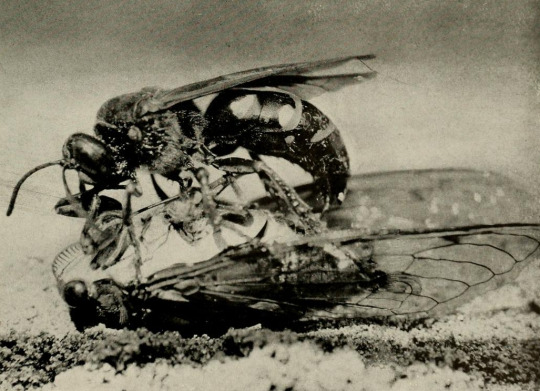
Digger wasp preying on a cicada
By: Paul Griswold Howes
From: Natural History Magazine
1933
#predation#animal death#wasp#hymenopteran#insect#arthropod#invertebrate#1933#1930s#Paul Griswold Howes#Natural History Magazine
83 notes
·
View notes
Note
if ur still doing requests pls rem if not das all g
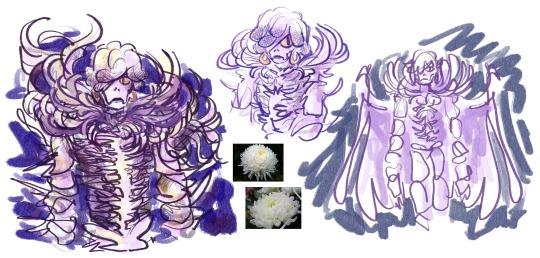
she’s chrysanthemum-coded to me <3
close-ups ig

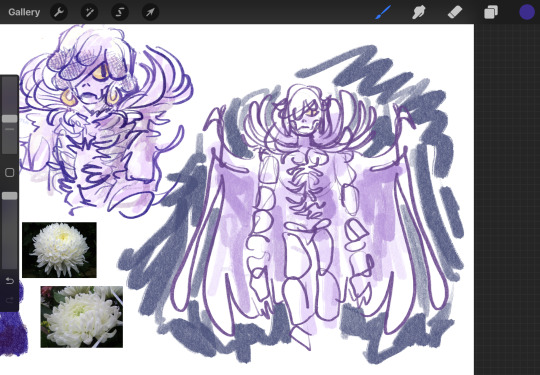
#ask#death note#rem#very messy i apologize#was extra messy here because i was playing with a new brush and by that i mean a default brush that i've never touched before#i actually quite like it very fun i typically like brushes that are 100% or close to 100% opaque but this was fun i like how it layered#i think i'm gonna finalize my idea and perhaps render something fully for once because i feel up to it if flowers are involved#but i promise nothing#drew these left to right btw. there were also like 2 more but they were small and i gave up on them so wjatever#i like the last one the best i think i needed a bit to figure out how i wanted the petals to lay and i like that one the best#the silhouette feels good i like the shape the back i did start trying smth asymmetrical but rem is very symmetrical and i find the symmetr#paired with the wings feels very regal and powerful and almost cape-like as a silhouette which i am a fan of#if i did finish something i might add misa in which case i need to think of what flower she most resembles roses are too easy i need smth#else but i will decide that later bc i am writing this very late at night and now i'm gonna queue it up for tomorrow bc i am going somewher#so goodbye goodnight good day idk what time it is for you. so#WAIT I SHOULD DO RYUK TOO WAIT WAIT soon. soon. he will be a bug yes yessss wait wait if he's a bug i want misa to be butterfly themed#like maybe a beetle of some kind? no no no wasp? ant? i'll think abt it#light would prob be some sort of poisonous plant? idk if u have thoughts idk tell me i'm getting into this bc i'm deprived of springtime at#and it is making me silly :3 teehee anyway i will Think about this and get back to it soon enough#gooddbye bye bye sayonara you weeaboo shits idk. bye
23 notes
·
View notes
Note
It's my favorite day of the week again (specifically your WIP Wednesday) and I would love any updates on New Kings or Bake Off if you are so inclined 😊
WIP Wednesday Game 8/9/23 (Closed) | New Kings AU
Eventually the bags started to come and Matt went to grab Neil's and Wymack came over to help since he actually knew what they looked like.
Wymack kept Neil and Andrew in the corner of his eye as he pointed out the bags and grabbed one as Matt grabbed the other two. Andrew Kept Neil close pulling him clear of any overly exuberant child who might run into him while Neil and Kevin spoke
The girls and Aaron made their way over to where Neil and Andrew were as Matt and Wymack brought over the bags. "Let's get you to Abby." he says.
"He needs a real hospital." Aaron says with a frown.
"Well then Dr. Minyard," Andrew's voice cuts in as he grabs his brother's arm. "You can come along." he says with a medicated smile.
"This is ridiculous." Aaron grumbles but didn't try to shake his brother's hand.
#New Kings AU#AFTG#AFTG AU#David Wymack#Palmetto State Foxes#Andreil#New Kings - The Return - Pt. 13#WIP Wednesday Ask Game#WIP Wednesday Catch-Up#3/15#I have surrounded myself with Citronella candles#like the pope with fire back during the Black Death#I think I am more scared of the wasp#Than that old man was to meet god
54 notes
·
View notes
Text
On the "darker" side of being comforted by one's immortality (not in the physical, but metaphorical), I've always been comforted by bone needles.
The idea that even after death, you've still been remembered by how you are used. No, bone needles probably weren't used with human bones, but it's a reminder that you aren't just going to... disappear. I'm comforted in the knowledge that I don't end in a "me" but in a "we," in nature. Everything about me is reused material so much more ancient than I am, and knowing that, I feel so much closer to the world.
#positivity#death positive#death tw#i know i mentioned the last part in a different post but i will never ever forget that nor will i talk about it only once#and the fact that we've found fifty THOUSAND year-old bone needles comforts me too#if you want immortality then there - that's your immortality staring you in the face!#we like to concieve of immortality as something you hold direct witness to but that's only a fantasy...#...in reality you will be immortalized - or likely will be - but it's in such a way you won't be able to witness it firsthand#i have always grappled with the knowledge i could be remembered and recognized and noticed in ANY way#i don't want that and knowing that i am simply borrowing what makes me 'me' does comfort me#it takes the burden off of being Me if that makes sense#this isn't about self-hatred but a burning desire to perfect the craft of being an actual person#i was so absorbed in being Me that i forget that i am part of this universe#human-centeredness will convince you that humans are almost... separate from the universe...#...that humans are unique from the concept of Nature and the World...#...blame it on capitalism or blame it on hubris or blame it on lack of insight... but when you discover how directly connected...#...to the universe you are i think you can learn to sit and appreciate... all of it#from the beetle crawling over your shoe to the wasp gazing into your car mirror... you'll appreciate it#i wonder if anybody else Gets what i'm ranting about here. i always feel weird talking about the things that bring me comfort
42 notes
·
View notes
Text

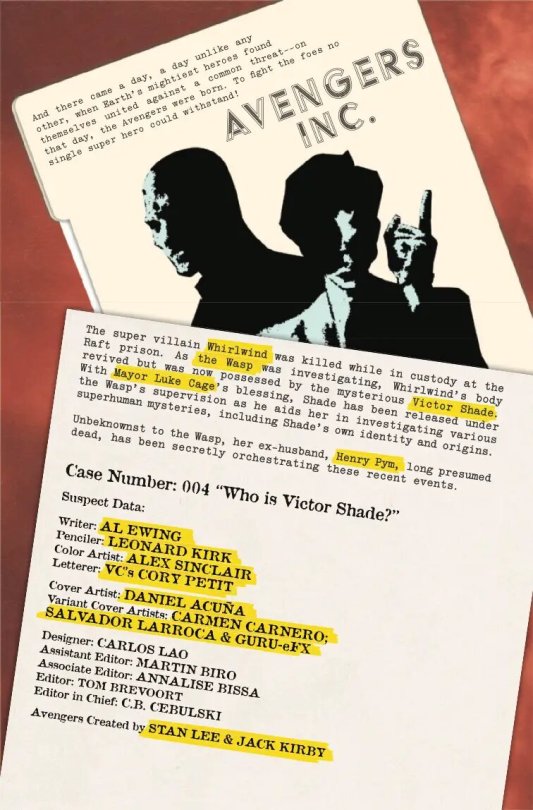
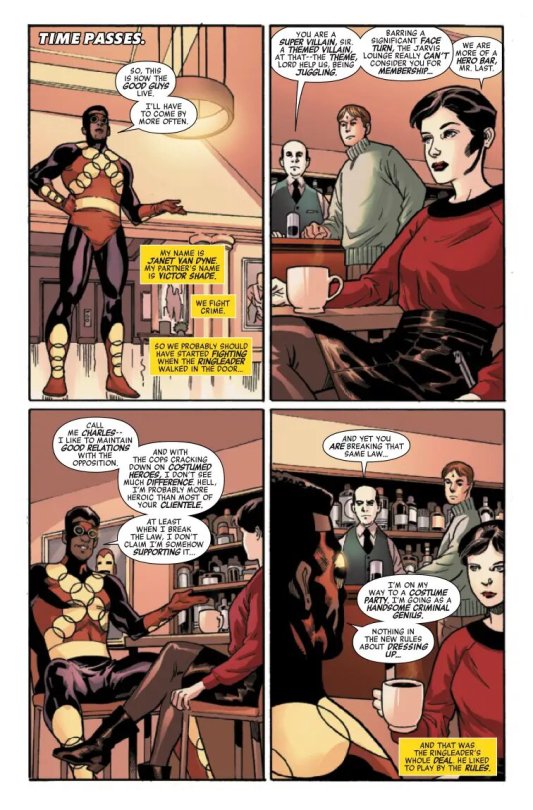

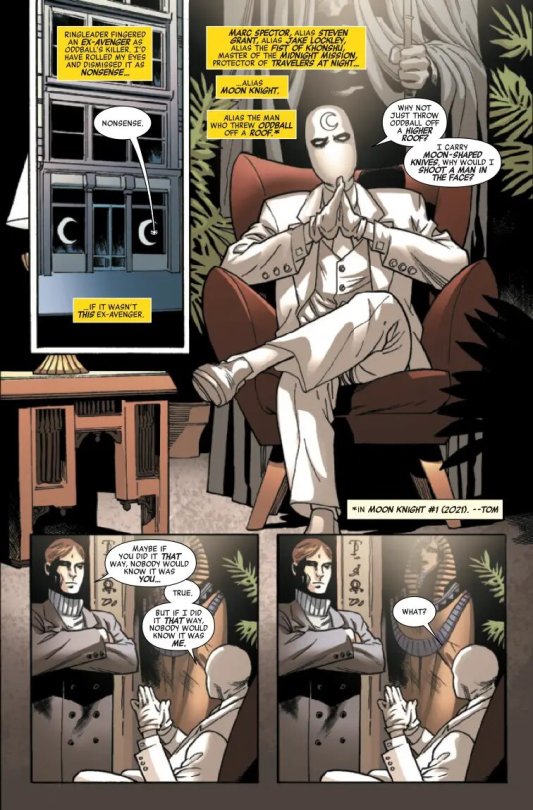

A preview of Avengers Inc #4
AVENGERS INC #4
GO FOR THE JUGGLER! Her name is Janet Van Dyne. She’s got a file on the Death Throws—a worker’s co-operative for themed super villains—that’s taller than she is. His name is Victor Shade. Apparently, he’s been a member for years. Together, they’ve got to find out who’s picking the Death Throws off one by one…before it’s his turn. PLUS, IN HIS VERY LAST GUEST APPEARANCE PRIOR TO HIS DEMISE, MOON KNIGHT!
Written by: Al Ewing
Art by: Leonard Kirk, Alex Sinclair
Cover by: Daniel Acuña
Page Count: 28 Pages
Release Date: December 27, 2023
#Wasp#The Wasp#Janet Van Dyne#Victor Shade#Jarvis#Edwin Jarvis#Avengers Inc#Avengers#The Avengers#Ringleader#Charles Last#Death Throws#Moon Knight#Mister Knight#Mr Knight#Marc Spector#jake lockley#steven grant#marvel preview#marvel
26 notes
·
View notes
Note
would you be down to summarize the podcast ep briefly ?<-guy who sucks at podcasts
i had clipped some stuff for the first part already so i'll add them in!
bdubs cites steve carrell as an early inspo, because the office was popular at the time he started making videos; he also talks about watching looney tunes as a kid and says his delivery as a character is similar to daffy duck
(impulse also cites bdubs as an inspo of his own, goes as far as to say he mimicked him in some early videos)
skizz talks about bdubs' delivery and acting being part of the reason people assume the life series is scripted. they also have a nice acknowledgement of the problems that come with planning and scripting.
bdubs mentions seananners, coestar and his brother pungence as some of the first people he saw playing minecraft.
impulse say that in bdubs' first video he promises to become one of the best minecraft builders there is. bdubs gets very humble and mentions again that he's not good with compliments.
bdubs says he draws now but before minecraft had basically no creative talent, outside of music, which he had to work hard at. skizz goes on an insane tangent about his high school girlfriend drawing a pointillism piece of a lion that seamlessly transitioned into sean connery halfway across the page. i had to rewind this part a few times because i kept losing track of what the fuck he was talking about
bdubs initially kept being a youtuber a secret from his wife, who he was still dating at the time, and planned to give it up when he got married and become a contractor full time. however, when he told her about it, she encouraged him and was the person who suggested he take it full time; bdubs himself says that since it was a family business, he would never had given it up without her encouragement.
impulse talks about meeting the mindcrackers as a fan, and how bdubs took the time to speak properly to every kid at his table and give them autographs, to the point where the building actually closed up and he still had people waiting- so he took them all out and did more autographs and meets in the parking lot
they talk about beau the trucker, his streamer persona, and how that came about (it was generikb's idea). bdubs said part of the reason he switched to streaming at that time was because content creation is a 24/7 job and it was putting strain onto his wife who was struggling to take care of their two children. i can't really summarise this well as it's a personal anecdote but it begins at about 38 minutes in. he also mentioned he was very nervous about singing on stream.
this leads into them talking about the "dark moments" and valleys in the career of a youtuber, where bdubs discusses the death of his daughter ivy rose; again, i don't feel comfortable summarising this, but it's a very touching discussion of how he couldn't imagine making content again but decided he didn't want people to associate her with him not making videos anymore. it starts at around 52 minutes in.
that brings them up to him coming back to hermitcraft season 6, where the video ends! bdubs promises to talk about his onlyfans in the next episode.
23 notes
·
View notes
Photo


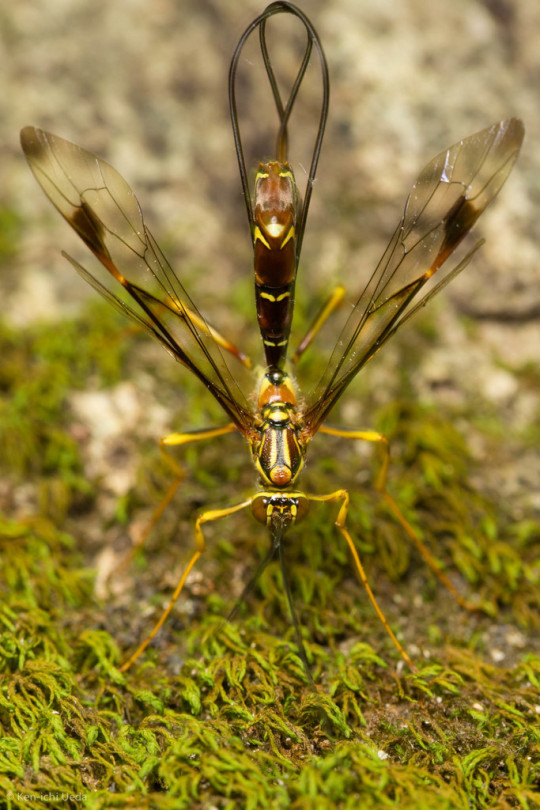
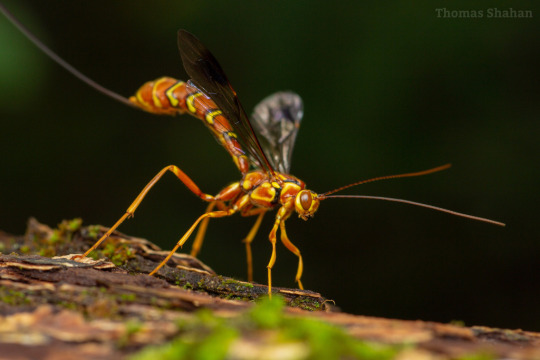
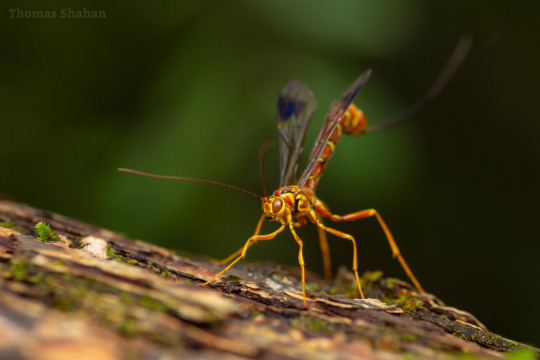
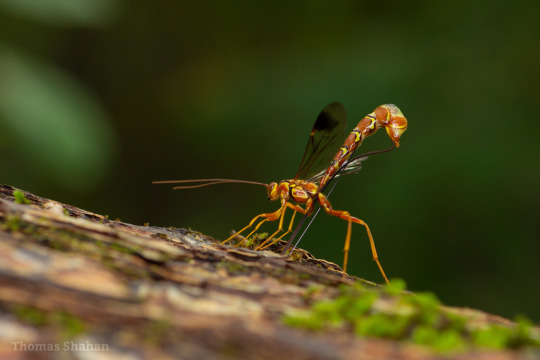
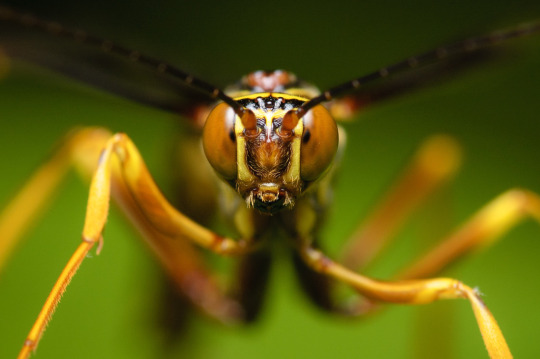
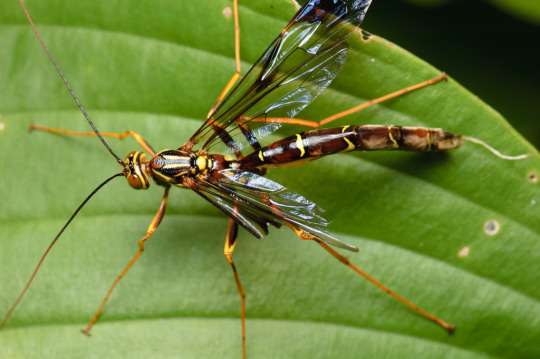


Long-tailed giant ichneumonid wasp, Megarhyssa macrurus, Ichneumonidae
Found in the eastern United States and up into southern Canada.
This species is a parasitoid of the larvae of the pigeon horntail, which bore tunnels in decaying wood. Female wasps detect larvae in the wood and use their long ovipositor to drill to them, paralyzing and laying an egg on the horntail larva. The wasp larva will then consume the body of the horntail larva before pupating and emerging as an adult wasp.
Photos 1-3 by kueda, 4-6 by tshahan, 7-8 by claggy, 9 by nashuagoats, and 10 (for scale) by shloftus
#animals#curators on tumblr#insects#bugs#wasp#ichneumonid wasp#Megarhyssa#giant ichneumonid wasp#long tailed giant ichneumonid wasp#one nice bug#parasitoid#bug death#mentioned
635 notes
·
View notes
Text
Polka-Dot Wasp Moth - Available

Luna Moth - Available

Death's-Head Hawkmoth - Available
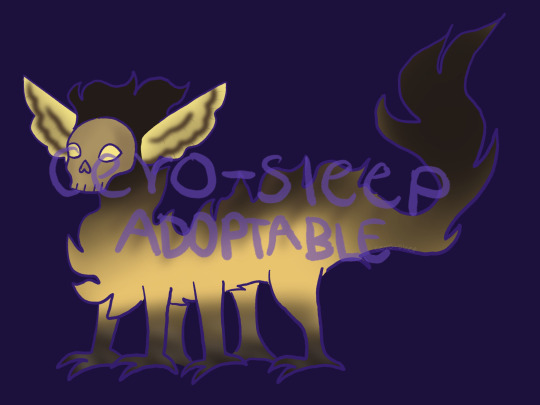
New moth themed milagro adopts! Selling them in chicken smoothie and kofi for $15!
#milagros enmascarados#adopt#adopts#adoptable#adoptables#closed species#closed species oc#closed species adopt#cero's adopts#dragon#dragon adopt#dragon oc#moth#luna moth#polka dot wasp moth#deaths head hawkmoth#moth adopt
17 notes
·
View notes
Text
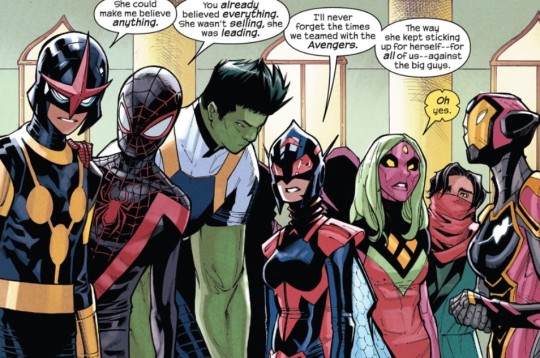
I miss the Champions 🥺
Fallen Friend: The Death of Ms Marvel (2023)
#fallen friend the death of ms marvel#miles morales#spiderman#sam alexander#nova#amadeus cho#hulk#nadia pym#the unstoppable wasp#viv vision#red dagger#kareem#riri williams#ironheart#marvel champions#ms marvel comics#marvel comics#marvel#marvel 616#g willow wilson#mark waid#saladin ahmed#ms marvel#wednesday spoilers
52 notes
·
View notes
Text
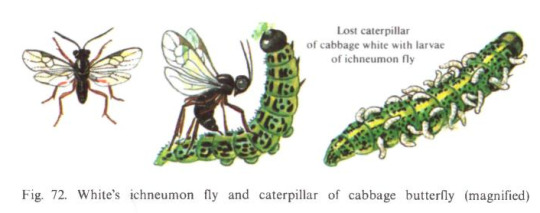
Zoology - Textbook for Schools. Edited by D. Naumov. 1985.
Internet Archive
145 notes
·
View notes
Text
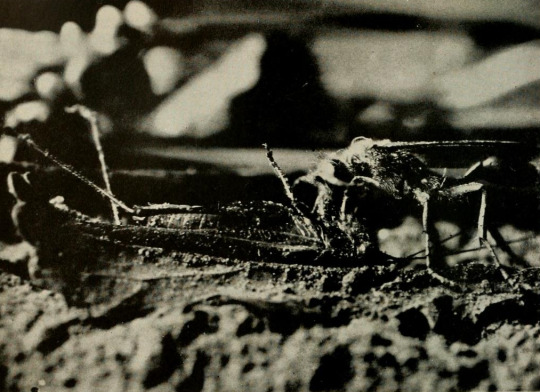
A wasp preying on a grasshopper
By: Paul Griswold Howes
From: Natural History Magazine
1933
#predation#animal death#wasp#hymenopteran#insect#arthropod#invertebrate#1933#1930s#Paul Griswold Howes#Natural History Magazine
21 notes
·
View notes